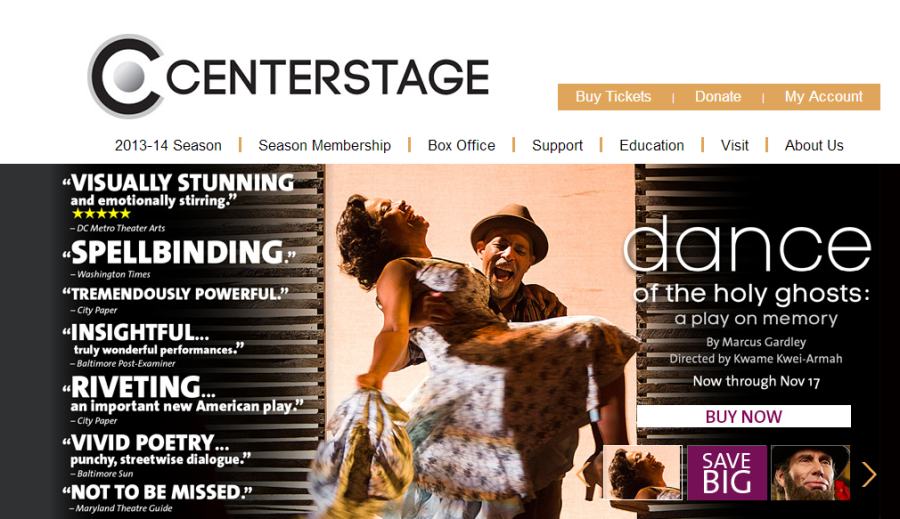While in the midst of its fifty-first season, Center Stage, a theater in Baltimore City, is currently showing Dance of the Holy Ghosts: a Play on Memory, an original play by Marcus Gardley. On November 13, 2013, I had the opportunity to attend a Sunday evening performance of this play. Since I had greatly enjoyed a previous production at Center Stage last May, I had high expectations for Gardley’s Dance of the Holy Ghosts, and once again, I was impressed, mostly by the playwright’s ingenuity and poetic language of the script.
Gardley’s drama explores the power of memory, music, forgiveness, and love within a family. The time-shifting plot explores the life story of Oscar Clifton, a lonely old man and Blues musician, and his relationship with his family, especially his grandson Marcus, through his memories of the past and events of the present. The complex plot is set in both Oakland, California and Monroe, Louisiana during the 1940s to modern times.
The drama explores moments of happiness and tragedy within the family, and Oscar reflects how his previous life choices have affected his present state. Oscar often sees and speaks to the spirits of his wife and granddaughter. Additionally, Blues plays an important role within the play. Just as his family’s spirits revives Oscar’s memory, Blues music causes Oscar to reminiscence about the past. The playwright Gardley puns on the word “blues” within the play because both Blues music and the color blue are motifs that can be seen within the play.
Interestingly, I learned from the play’s program that Gardley’s drama is somewhat autobiographical. Many elements of the play were inspired by Marcus Gardley’s own life experiences. For example, his own grandfather died before Gardley was able to form any positive relationship with him. In fact, Gardley’s only memory of his grandfather was a rather negative incident in which Gardley broke his grandfather’s gumball machine. Because this is his only memory, Gardley feels that he misunderstood his grandfather’s true character, which is why he created this play to embody who he believes his grandfather was as a man. Additionally, in an interview, Gardley describes how he feels that he lacked male role models during his childhood. This autobiographical information is apparent in the play because Oscar’s grandson, who like the playwright is named Marcus, also lacks any real male figure, which is why his relationship with his grandfather is so important to him.
While watching the play, I also noticed a sort of feminist component. For the most part, all the women in the play are portrayed as strong, independent, hard-working women, whereas most of the men appear weaker in character. At one point of the play, Oscar comments about his grandson’s upbringing by all women. Enraged by this comment, Marcus announces that he believes that women who raised him are gods. The playwright expresses a similar idea in an interview with Catherine Maria Roderiguez. When asked what Blues musician he would listen to if he could only listen to one for the rest of his life, Gardley answered, “Bessie Smith… I like [her music] because Bessie Smith lived at a time when women were low on the totem pole, and she empowered herself. She’s a champion to me. I know when people think of these men. Oscar’s a man, but for me this play is – the women are gods.” This play champions women which, I personally believe, is refreshing to see.
For anyone who is interested in seeing Dance of the Holy Ghosts, please note that performances will continue at Center Stage until November 17th. I would highly recommend it! (This play does contain some crude language and mature themes, so I would not recommend that younger children see this play.) After Dance of the Holy Ghosts, the next play to be shown at Center Stage will be A Civil War Christmas starting on November 19th.

